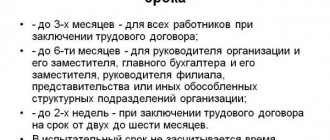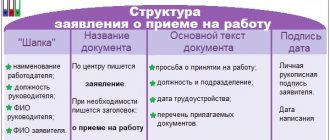One of the common violations by employers in Russia is evasion of the provisions of the law on a probationary period when hiring. Unscrupulous employers, taking advantage of candidates' ignorance of their rights, put them at a disadvantage. Sometimes the test is strictly prohibited by law, and in other cases, it is imposed with restrictions.
To be able to protect your rights, you need to know the provisions of the law on probation, which make it clear the meaning of the tests and the procedure for installing them.
Definition according to the Labor Code of the Russian Federation
The hiring test is regulated by Articles 70-71 of the Labor Code of the Russian Federation. The provisions do not disclose the exact definition of the concept, but, based on the “general spirit” of the articles, you can formulate it yourself:
A probationary period is a period during which the employer exercises its right to assess the employee’s abilities and decide whether he is suitable for the work assigned. To prevent abuse of this right, the employer cannot go beyond the law.
Attention! You cannot force an applicant to work during the “test” period. He must agree to this condition himself. However, in reality, it is difficult to find a vacancy without such a condition, so in a certain sense, obtaining consent from an applicant for the position is just a formality.
Purpose of the test
Passing the employee test has benefits for all participants in the labor relationship. By including this condition in the employment agreement, the employer gets an idea of:
- practical skills of the candidate for the position, his qualifications;
- his ability to perform assigned tasks in a team
- ability to adapt to a new environment;
- employee discipline.
Having correlated the information received with the requirements of the vacancy, the employer decides to continue or terminate cooperation with the applicant. Without such testing, it would be problematic to find out true information about a future employee, which means there would be a high risk of “missing the mark” with the choice.
For the applicant himself, passing the admissions test also has several advantages:
- He understands more clearly what he will do.
- He can assess whether he can cope with the load and whether his abilities meet the stated requirements.
- He will decide whether the work team is right for him.
If any items become unsuitable for the employee, he can always stop testing. If a probationary period were not assigned, and the applicant was immediately hired, he would have to work for 2 weeks before being fired. In this case, this period is reduced to 3 days.
By whom and how is it installed?
The probationary period is established at the initiative of the party providing the work. It can be assigned in 2 ways:
- When drawing up an employment agreement. The employer puts forward a condition for passing the test, the applicant accepts it, and the parties add a corresponding clause to the agreement. If the applicant refuses, and the employer insists on passing the verification period, the employment contract is not concluded.
- The employment relationship is concluded based on the fact that the employee performs the job functions assigned to him, but before that a probationary agreement has been drawn up. Then, no more than 3 days after admission to work, the parties enter into an employment contract. It includes a condition regarding the period during which the employee’s business and personal qualities are checked.
Reference! It is not possible to formalize an agreement to undergo an inspection “retrospectively”. If the employment contract does not contain a clause on this condition, it means that the employee is hired without going through it.
Conditions of appointment
During the verification period, the employee is protected by labor legislation. He cannot be infringed on his rights or discriminated against for any reason. To protect against violations by the employer, he has all the tools guaranteed by labor legislation to “ordinary” employees.
During the trial period, all employee responsibilities are specified in the employment contract and/or job description. Management does not have the right to demand that an employee undergoing a probationary period perform functions not included in the documents.
How long can it last
The length of the probationary period is limited at the federal level. Deadlines vary:
- for “ordinary” workers and management;
- for those concluding an employment contract on a “permanent basis”;
- for persons planning to work under an agreement for a short time (from 2 to 6 months).
Important! If an employee is absent (even for a good reason - illness), then the probationary period is suspended. Only time actually worked is counted.
Maximum and minimum
In order to prevent abuse by employers, as the stronger party in the employment contract, the legislator determined the maximum possible duration of the tests:
- Up to 3 months – for ordinary employees.
- No more than 6 months – for heads of organizations (structural divisions) and their deputies, as well as for chief accountants and their deputies.
- Up to 14 days – for employees with whom a short-term employment contract is concluded (from 2 to 6 months).
The minimum period for passing the inspection is not established by law. If 1-2 days are enough for the employer to “get to know” the employee, then after these days a decision can be made. In practice, such a short period does not occur.
Excess or early termination
Extending the probationary period is a controversial measure on the part of management. It is not directly provided for by labor legislation. When considering disputes related to the extension of the period for checking the business qualities of an employee, the courts take one of two positions:
- Recognize exceeding the term as illegal, since the law says that the probationary clause is included in the employment contract at the time of its conclusion.
- Resolve the dispute in favor of the employer and recognize the extension as legal on the basis of a general rule that provides the opportunity to change the employment contract at any time by agreement of the parties.
Reference! The employer cannot extend the period without the consent of the employee. He also does not have the right to dismiss an employee who has passed the initially established period of testing. If this does happen, it makes sense to go to court; it may take the employee’s side.
With the early reduction of the test period, everything is clear, since it does not infringe on the rights of the employee. The same applies to termination of the trial before the expiration of the period specified in the agreement. The opportunity to terminate an employment contract without waiting for the end of the test period is provided for in parts 1 and 4 of Article 71 of the Labor Code of the Russian Federation.
The right is granted to both parties, subject to certain nuances. The initiating party must notify the other party in writing of the termination of the agreement at least 3 days in advance. And the manager also undertakes to list the reasons why this employee is not suitable for him.
Attention! If the reasons seem “far-fetched”, there are no documents confirming the employee’s incompetence, violation of labor regulations, etc., then the employee has the right to go to court to restore violated rights.
Dismissal during the probationary period and at its end
Both parties who entered into an employment agreement have the right to terminate the contract during the probationary period and at its end. According to Article 71 of the Labor Code, an employer can sign a dismissal order if an employee fails to cope with his professional duties. It is possible to terminate an employment contract by agreement of the parties or at the request of the employee.
There is a category of persons whose dismissal will be considered illegal. This category includes:
- pregnant women;
- single mothers who are raising disabled children (under 18 years old) and children under 14 years old;
- women who raise children under 3 years of age;
- other persons raising a small child without a mother;
- parents with many children who have more than 3 young children in their family.
The law does not provide for the payment of severance pay in this situation. If the manager did not take care in advance to inform the young specialist about his professional unsuitability before the deadline specified in the employment agreement, the reason for dismissal will be canceled.
During the probationary period and upon its completion, the employer has grounds to dismiss the employee if the following were noticed on his part:
- unprofessional behavior;
- absenteeism;
- committing offenses at the place of work;
- ignoring the rules of labor discipline.
Before issuing a dismissal order, the head of the company is obliged to warn the employee in writing 3 days in advance.
Reference! If an employee needs to be dismissed after the completion of the probationary period, then professional unsuitability cannot be the reason for termination of the employment agreement.
Probationary period depending on the job
There are certain types of work for which tests have some specifics. It consists of increasing/reducing the maximum duration of the employee evaluation period. Some non-standard categories:
- Chief accountants, heads of organizations. The competence and professionalism of these employees is difficult to assess in the short term. Therefore, the legislator increased the maximum limit for the evaluation period of management personnel to 6 months.
- Seasonal workers. The specificity of relations with applicants for seasonal work is a short period of labor relations (from 2 to 6 months). Therefore, it is not advisable to evaluate the qualities of employees over a period of 3 months, as with ordinary candidates. Because of this, for the category of seasonal workers, the period for checking professional qualities has been reduced to 2 weeks.
- Young professionals. The social state is obliged to provide equal opportunities to both professionals and graduates of higher and secondary specialized institutions. Therefore, the legislator allocated a preferential place for young specialists, who often do not even have work experience – hiring without testing.
Reference! The law classifies as beginning specialists graduates of secondary specialized and higher institutions who have completed educational programs that have state accreditation. The benefit for hiring without testing is valid once within a year after completion of training.
Situation 4. Length of period
An employee gets a job as an accountant. She was given a probationary period of 6 months. Is this legal?
According to Article 70 of the Labor Code of the Russian Federation, the probationary period cannot exceed three months. The exceptions are heads of organizations and their deputies, chief accountants and their deputies, heads of branches, representative offices or other separate structural divisions of organizations, for which the test is established for a period of no more than six months. But in our case, a person gets a job as an accountant, and not as a chief accountant or his deputy. Thus, a probationary period of 3 months is the maximum duration. And if the employment contract is concluded for a period of 2 to 6 months, then the trial cannot exceed two weeks. When concluding a contract lasting less than 2 months, there is no trial period at all.
IMPORTANT!
During the trial period, days of temporary incapacity for work of the employee and other periods when he was actually absent from work are not counted. That is, if an employee is assigned a probationary period of 2 months, and he was sick for 2 weeks of these two months, then the probationary period is extended by two weeks.
Registration procedure
Testing of an employee’s professional qualities is necessarily reflected in the employment contract. A separate clause stipulates that the employee is subject to a probationary period. Its duration is indicated.
Attention! An entry about the appointment of the test is not made in the work book.
If the employment contract does not specify the conditions for establishing a test period, then the employee is considered hired by this employer without fulfilling it. If such a condition is included in the hiring order, but is not specified in the contract, it is also not valid.
At the end of the trial period, the employee is often asked to fill out a form by answering questions similar to the following:
- What were the difficulties, and were you able to overcome them?
- Which tasks were completed and which were not, and why.
- What information was new to the employee.
Such forms help management decide whether to continue cooperation with the candidate or not.
How is it paid?
In the Labor Code of the Russian Federation, the probationary period does not differ from regular working hours. Therefore, it is subject to appropriate payment. Like other employees, a probationary employee’s salary depends on:
- his qualifications ;
- the amount of work performed and its complexity ;
- the quality of the work done.
Also, an employment contract has already been concluded with employees of this category. And it must indicate working conditions, including the amount of payment.
Reference! The salaries of persons on probation and those who have completed it cannot differ, provided they perform the same work.
Different rules are established regarding bonus payments. The employer’s local regulations may stipulate that bonuses are paid only to employees with a certain length of service. In this case, the “newbie” is not entitled to additional payment.
If an employee fails the hiring test, he does not lose his wages. He can receive payment on the day of dismissal.
Who does not apply to?
Part 4 of Article 70 of the Labor Code of the Russian Federation lists categories of citizens who are exempt from testing when applying for a job. These include:
- persons who passed a competitive selection for the relevant position or were elected to it;
- graduates of universities and secondary vocational institutions who have completed educational programs that have state accreditation. Moreover, they must enter work for the first time, in the year in which they graduated from the educational institution;
- pregnant women, women with a child/children whose age does not exceed 1.5 years;
- minor citizens;
- persons transferred to work for another employer (by agreement of enterprise managers);
- persons who enter into an employment contract for a period of less than 2 months.
Among other categories of citizens who are provided with benefits are:
- persons who have successfully completed an apprenticeship in a specific company and enter into an employment contract in the same company;
- persons who have successfully completed sports training under sports training contracts and who have decided to enter into an employment agreement with the contract customer.
Attention! The lists provided are not exhaustive. Beneficiary groups may be supplemented by law or collective agreement.
Concept of work plan
This act reflects several sections, which are accompanied by a specific topic. The following questions are subject to reflection:
- tasks assigned to the employee;
- period for its execution;
- the result that will be achieved in fact;
- what the company expects from the citizen;
- curators' comments.
Often, a company assigns the responsibility for drawing up the act in question to the employee who is more experienced. This includes employees of the personnel department or the direct management of the department where the person works.
The plan is formed in order to establish how effectively one is able to work in a particular company. In addition, this act helps to avoid the occurrence of controversial situations in the future.
Admission without probationary period
The test period is not mandatory for hiring, so the employer can hire without assigning an IP.
In this case, the employee begins to perform work duties from the date specified in the agreement.
If an employee is hired without a trial period, then he cannot be removed from work for reasons not directly specified in the Labor Code. The employee retains the right to resign at his own request. However, you will need to notify your boss about this in advance - 2 weeks. This period will need to be worked out (provided that the employee is not on vacation or sick leave).
Successful completion
The period of work under consideration ends with the occurrence of one of three events :
- The parties are satisfied and there is no need to continue working in test mode.
- One of the parties decided to terminate the employment contract.
- The verification period has expired and no one has expressed a desire to terminate the employment relationship.
In exceptional cases, the probationary period may be extended. How and when this can be done - read the article “Is it possible to legally extend the probationary period under an employment contract?”
Certification
The ideal way to complete the test is to conduct a certification . Such an event is carried out in accordance with the certification regulations in force in the organization. Consequently, a new employee will undergo exactly the same verification of suitability for the position held by his colleagues who have been working in the organization for a long time.
.
When does the probationary period end?
The stage of checking the employee’s qualifications ends after the expiration of the time period for which it was established. If both the employer and the employee are satisfied with everything, then the verification stage can be shortened by agreement of the parties .
Test results
The results of work during the probationary period are almost always positive . No one will wait for the preparation of the final report and characteristics of the employee in order to terminate the employment relationship with him. By the end of the first month, dynamics will be visible : either the employee copes and improves his results, or he “doesn’t cope.”
If the employee has not completed the probationary period, the employer should retain the test report and the employee’s references. Article 71 of the Labor Code of the Russian Federation allows an employee to appeal such dismissal in court. During such proceedings, objective evidence that the employee really did not cope with the job.
Probation period report
The report is the most important document drawn up based on the results of the employee’s work in test mode.
It reflects a person’s ability to perform their job duties.
The report is compiled by the curator to whom the newcomer was assigned.
The document is drawn up according to the plan that was adopted for testing the employee.
The report should reflect how the employee coped with tasks , what mistakes he made, and how he corrected them. It is possible to use a scoring scale for a more objective assessment.
The report must be prepared no later than 2 weeks before the end of the employee competency testing period.
(on behalf of the curator), as well as the employee’s own report form (self-analysis sheet).
Characteristics of the employee after the verification period
The employee's profile should reflect all his business qualities, ability to work in a team, and so on.
This document is drawn up by the newcomer’s immediate superior and attached to a previously compiled report.
Conclusion on passing the probationary period
The conclusion is drawn up based on the report and characteristics of the employee. This document is developed by a recruiter, or one of the qualified colleagues of the new employee who works in a similar position. The conclusion actually summarizes all the results of the new employee’s work during the test, so that it is easier for the head of the organization to make a reasoned decision regarding further cooperation with the newcomer.
Rights and obligations
During the test period, the employee is granted all the rights of an ordinary employee. Among them: the right to wages, safe working conditions, etc. Responsibilities are prescribed in the employment contract, established by labor legislation and local regulations of the employer. If necessary, a liability agreement is concluded, as with other employees.
The employer's specific rights include 1 point: dismissal of an unsuitable candidate under a simplified scheme. You only need to justify the reason for dismissal and notify the employee in writing of termination of the contract no later than 3 days in advance.
In relation to an employee on probation, management more actively exercises the following rights:
- Supervises the quality and timing of work.
- Records the results of the employee performing the functions assigned to him.
- Requires him to report on the work done, and if the performance is unsatisfactory, an explanatory report.
The main responsibilities of the employer include fulfilling the rights of the employee. In relation to an employee on a probationary period, the employer has an additional obligation - to document the grounds for dismissal. To do this, disciplinary offenses and shortcomings in work must be indicated in writing. Without them, refusal to continue working with the employee will be illegal.
Rights of employee and employer
The attitude towards the company's employees who are on the IP must be identical to the rest of the institution's personnel. An individual applying to occupy a certain position is officially registered, and a record of employment is entered into the work book. A new specialist may qualify for:
- sick leave;
- business trips;
- additional payment for processing.
The only drawback of the test is the employer’s right to early dismiss a new specialist who has not demonstrated professionalism.
Pay for new staff may be slightly lower. Managers promise an increased rate only after successfully passing the test. However, it is important to remember that even at the time of adaptation, wages should not be lower than the minimum wage .
The employer has the right to adjust the work of a new employee. If a candidate for a position did not live up to expectations, was unable to cope with professional responsibilities, or ignored the rules of labor discipline, the manager may fire him without waiting for the completion of the assessment of the candidate's abilities for the position.
It is important to notify the employee in writing of the upcoming dismissal 3 days in advance. If this is not done before the completion of the test, then it will be illegal to indicate professional unsuitability as a reason for terminating the employment agreement. In this case, the candidate for the position will be able to apply to the court for reinstatement at work.
Important! It is unacceptable to prescribe the passage of IP unilaterally.
Useful video
The Labor Code of the Russian Federation strictly regulates the conditions and procedure for passing the test when applying for a new position. The employer cannot set a trial period for a period longer than 3 months (for managerial vacancies - more than 6), and for short-term employment contracts - more than 2 weeks .
After the specified period, the employer is obliged to make a decision on how successfully the test was passed. In case of an unsatisfactory assessment, the contract with the applicant is terminated. If the employee continues to perform duties, he is considered to have successfully completed the trial period and accepted a new job.
Optimal period
Three months is the most optimal period of time for a probationary period. During this time, the candidate will demonstrate his abilities and character traits, and it will become clear to management whether the new employee will be able to fit well into the team and the work process.
More than 15% of personnel officers believe that a two-month period is sufficient to check an employee and make a decision on his enrollment in a vacant position.
The main thing for the employer is not to exceed the duration of the probationary period provided for by law (Article 70 of the Labor Code of the Russian Federation).
How long the test for a new employee will last is determined depending on the specifics of the vacant position. A welder or turner can instantly demonstrate their talents, but a manager or financier will be able to fully demonstrate their professional skills within a few months.









